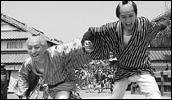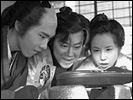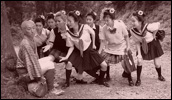Yaji and Kita: The Midnight Pilgrims
- Year
- 2005
- Original title
- Mayonaka no Yaji-san Kita-san
- Japanese title
- 真夜中の弥次さん喜多さん
- Director
- Cast
- Running time
- 124 minutes
- Published
- 22 January 2006



by Adam Campbell
With Zatoichi already given an update by Takeshi Kitano and Tora-san's death perhaps a little too fresh, Kankuro Kudo has reached even further back to dig up two other fondly remembered wandering characters from Japan's cinematic past in need of a new lick of paint. While nowhere near as widely known today as the lovable tramp or the blind swordsman, Yaji and Kita spent quite a few years in front of the cameras on their travels (such as in the adventures directed by Tomiyasu Ikeda in the late 1920s, available on DVD from Japan's Digital Meme alongside Daisuke Ito's Jirokichi the Rat). Based on a more revisionist modern manga version rather than the older material, the new cinematic adaptation takes a sharp departure from what those familiar with past incarnations may be expecting. Nothing less is to be expected from Kudo, no stranger to the absurd as the writer of such internationally popular films as Sixty Nine, Iden & Tity, Zebraman, Ping Pong, and Go.
Perhaps most surprising for the directorial debut of a writer, the actual plot of Yaji and Kita is mostly quite scant. During the Edo period, gay lovers Yaji and Kita decide to run away from stuffy old Edo and head for Ise. Along the way, the couple make a number of stops where they encounter a range of colourful characters and embark on the required hi-jinx for this kind of trip - and I do mean 'trip'. Everything in the film world is treated with a cartoon glaze, including Kita's drug problem and their homosexuality. This pilgrimage kicks off with a bag of pills, Captain America's motorcycle from Easy Rider, and a rousing musical number containing the lyrics "Born To Be Gay".
Kita, played by Kabuki star Shichinosuke Nakamura, admits at the beginning "I can't make head or tails of reality", and the film often becomes a reflection of his drug addled mind. As such, time is not a strict one-way street. Rather than the modern era imposing on the past, the film portrays the past as being aware of the present. The contradiction of the modernity of cinema and the antiquity of the setting is embraced and used to colour the film. With the Paul Smith style yukata, model tanks, and modern pharmaceuticals, Yaji and Kita plays on the absurdity of nostalgia for an age that has no survivors.
Ise, the intended destination, is meant to be a haven where Kita will be brought back to reality, cured of his addiction and his fantasies. "Reality is out there" advertises the promotional card for Ise, but is reality what is best for Kita? Kudo frequently brings up the choice between accepting reality and enjoying fantasy. At the start of this picture, Kita already chooses fantasy. It's the brash, childish Yaji, played by pop star Tomoya Nagase, also seen in Michael Arias's Heaven's Door, who presses forward the road trip to reality. Despite the reason for the pilgrimage supposedly stemming from Kita, much of the film focuses on Yaji and indeed on Nagase himself.
Somewhat lost among Kankuro Kudo's list of achievements is the television series Ikebukuro West Gate Park or I.W.G.P. The first major project written by Kudo, I.W.G.P was a hip-hop styled gang drama which further raised the profile of future Go and Ping Pong star Yosuke Kubozuka, along with Tomoya Nagase. Yaji and Kita features an early scene with the pair acting like rap star wannabes, which can't help but invoke Nagase's I.W.G.P identity. With Nagase being a member of the formulaic boy band Tokio, it seems hardly an accident that one element of the plot involves Yaji trying to make a manufactured pop song for a tuneless girl. In another, a fickle fan club of schoolgirls' sudden and extreme devotion to Yaji leads to their untimely death. Critiques on the music industry and stardom, however broad and unsubtle, are certainly things Nagase is qualified to portray.
Being all too obvious is something which unfortunately hurts this film, as is being all too long. If there is a required point to be made about duality, couples and the number two, this film makes it like an episode of Sesame Street. Two best friends, homosexual and heterosexual lovers, reality and fiction, husbands and wives, fathers and sons, fans and idols, dependent and depended upon, alive and dead, and even two-man manzai comedy acts are all touched upon here. The problem is most of these elements, and the majority of the comedy, are all covered by the first hour, and this film runs much closer to 120 minutes than is entirely deserved.
Too much of the second hour is spent on trying to build some forced conflict between Yaji and Kita, to split them into two separate but equally tedious adventures. Kita's scenes in a dream-like forest bar seem created only to give guest star Arata something to do, although he looks sufficiently bored just the same. Yaji's protracted journey through the underworld seems suitably never-ending, but that is perhaps not the best material for comedy. Since no issues have been taken at all seriously up until this point, the angst that is ladled on becomes increasingly unwelcome and jars with the performances, especially Nagase's over the top shouting. Caught up in an unwelcome ball of melodrama, the film that had started out so energetically, eventually flops across the finish line. As the credits roll, practically everything that might have endeared you to the movie in the first half has been completely beaten out of you by the end of the second. As a debut directing effort, Kudo's work is not without merit, but his lack of experience shows in the uneven pacing and balance which eventually hobbles what could have been an enjoyable film - if not a particularly important one.